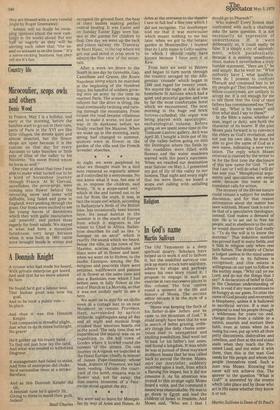Religion
In God's name
Martin Sullivan
The Old Testament is a deep spiritual quarry. Scholars have helped us to work it and to fathom it, but the unskilled surveyor can pick up many a rock here and there, admire its shape and perhaps weave his own story round it. I propose to engage in such an exercise in two successive pieces in this column. The first centres round a moment in the life and history of Moses. The ancient editor records it in the style of a storyteller. "Moses was keeping the flock of his father-in-law Jethro and he came to the mountain of God." It could simply have been that he was in search of better grazing; ordinary things like daily chores sometimes lead to unexpected and exciting possibilities. Saul went out to look for his father's lost asses, and found a kingdom. It was while he was in pursuit of these wayward stubborn beasts that he was called back to ascend the throne. Moses, says our storyteller, suddenly stumbled upon a bush, from which a flaming fire leaped, but it did not consume it. As his attention was riveted to this strange sight Moses heard a voice, and the command it issued was unmistakable. He was to go down to Egypt and lead the children of Israel to freedom. And Moses said, "Who am I that I should go to Pharaoh?"
Who indeed? Every honest man confronted with such a challenge asks the same question. It is not necessarily an expression of unworthiness. If it were deliberately so, it could easily be false. It is simply a cry of astonish ment, which paradoxically, because it is entirely unselfcons cious, makes it nevertheless a truly humble statement. "Here am I," he said simply. But he went on: "What authority have I, what qualifications do I possess to confront Pharaoh and command him to let my people go? They themselves, my fellow-countrymen, are unlikely to accept me. It is not enough for me to tell them that the God of their fathers has commissioned me. They will say, 'What is his name?' and then what shall I say to them?"
In the Bible a name, whether of man, angel or deity, sets forth the character of its bearer. If the plan Moses puts forward is to convince the elders as God's revelation, and not just his own idea, he must be able to give the name of God as a new name, indicating a new revelation. The reply which Moses received is claimed by the writer to be for the first time the disclosure of this new name for God. "I am that Tam' or 'I will do what I will do' has sent you." Metaphysical arguments and speculations are swept aside, because this name as so translated calls for action.
The mystery of the Divine nature could remain a subject for endless discussion, and for that reason information about the matter has been withheld. Moses' task is not to be that of a speculative theologian; instead, God makes a demand of him. He is to set out to free his people, and in obedience to the call, he would discover who God really is. "To do the will is to know the doctrine." This inductive method has proved itself in many fields, and it fails in religion only when real faith falters. The divinity of Christ is lodged useless in the mind unless His humanity in its fullness is recognised; and this means a willingness on our part to follow in His earthly steps. "Why call ye me Lord, and do not the things that I say?' A declaration of belief in God, in the Christian understanding of Him, is void if any man continues to lie hungry at our gates. To utter the name of God piously and reverently is blasphemy, unless it is hallowed in sacrificial service. If a man is prepared to lead his people through a wilderness for years on end, change them from a rabble to a nation, nourish and nurture their faith, even at times when he is losing his own, put up with all their petty discontents, disloyalties and rebellion, and then at the end stand aside when they reach the Promised Land, and not enter it with them, then this is the man God needs for His people and whom the people themselves need. Such a man was Moses. Knowing the name will not achieve this. The answer to the question "What is God?" is answered by the events which take place and by those who act in His name whether they know it or not.


































 Previous page
Previous page